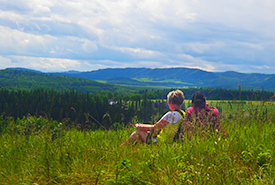It actually is all about you: Altruism, identity and other secrets about nature conservation in Canada

Connop Property in Alberta (photo by NCC)
There are many reasons why nature conservation is important. We live in a vast and diverse country with habitats and rare species that need our help if they are going to survive. Nature and nature conservation are an important part of our Canadian heritage and our identity.
For more than 120 years, Canadians have been leading the world in nature conservation. From our first parks (including Banff National Park and Algonquin Provincial Park), to game laws that stopped many of our animals from being blasted into oblivion at the turn of the last century, to local groups that protect and restore green spaces, there is a long and rich history of Canadians working to protect our wildlife and wild spaces.
Now you might think that this nature conservation work is all about wildlife or rare species or unique habitats — and you would certainly be right. However, there is another, maybe deeper, reason why nature conservation is important — and a reason why, even if you do not care about nature, you still benefit from conservation in Canada.
People are deeply connected to other living things. Beyond our biological needs for food, clean water and air, we have a strong, although sometimes dormant, affinity for nature. From our pets and houseplants to giving money that will protect species and spaces that we will never see, we have an innate attraction to the diversity, abundance and beauty of living things. While nature may seem like a frivolous externality for the modern urban human, there is a growing body of scientific studies that show we need nature. Again, this is beyond our basic biology — yes we obviously all rely on sunshine, photosynthesis and water to live, and are as much a part of the life, death and decomposition cycle as a pine tree or moose — but this attraction to nature is beyond just keeping our bodies alive. This need is about well-being, about creativity, about happiness; about being human.
The recently released Canadian Nature Survey shows that nature plays a central role in the lives of Canadians. More than half of us include access to nature in our selection criteria for deciding where to live and raise our families. This is a very high number for a country where nine out of 10 of us live in urban areas. Despite being drawn into urban centres for work and access to other amenities that city habitat provides, many of us also want to be close to nature. This could include urban parks, the rivers and coasts that are the foundation of all Canadian cities or nearness to wild lands where we can escape to nature.
Escape to nature we do. The Canadian Nature Survey showed that seven in 10 Canadians choose to spend time outdoors to experience the natural world. We all experience it differently; some people like to hike, camp, hunt or fish, while others bird or participate in volunteer activities.
Yet while almost all Canadians are drawn to nature, and every one of us benefits from clean air and water, there is only a small core of Canadians that actively support conservation work. But while the group is small, they have an impact that sweeps across the country, and will leave a legacy that will endure for generations.
Those Canadians that support the protection and restoration of nature are supporting more than just species and habitats. They are working to conserve something that is important to all Canadians now, and will be valued even more by future generations. And this really gets to the heart about one of the best-kept secrets of nature conservation: why it really matters.
While saving nature for nature’s own sake is important in its own right, saving nature is really a mission about Canada and Canadians. It’s about keeping our connections to the past, about the society we live in today and about maintaining and enhancing the quality of life for our children and for tomorrow’s child.
By saving nature, we are saving wellness — it is clean air and clean water, it will buffer and help us adapt to climate change and it is a healthy environment that attracts business and business leaders to Canada. By saving nature, we are also saving learning and enchantment — providing a stage for exploration and for the sparks of curiosity to ignite. By saving nature, we are saving opportunities for the human spirit. The ancient rainforests of the Pacific Northwest, the mysterious deep waters of Lake Ontario, the arrival of spring birds on the Great Plains — these are our places of solitude, our places of inspiration and of wonder, our places that define and shape us as Canadians.
These are the places that we must work to save.


